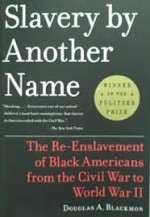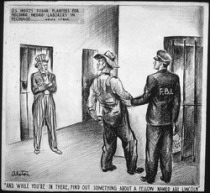Peonage and forced labor, Slavery by another name
Slavery by Another Name, PBS Film
Slavery by Another Name challenges one of our country’s most cherished assumptions: the belief that slavery ended with Abraham Lincoln’s Emancipation Proclamation of
1863. The documentary recounts how in the years following the Civil War, insidious new forms of forced labor emerged in the American South, keeping hundreds of thousands of African Americans in
bondage, trapping them in a brutal system that would persist until the onset of World War II. Read more
Peon and Peonage, Wikipedia
Also see:
Hodges v. United States, 203 U.S. 1 (1906) wikipedia
Bailey v. Alabama, 219 U.S. 219 (1911) Wikipedia
Peon Wikipedia
Peonage is a type of involuntary servitude of laborers (peons) having little control over their employment conditions. Peonage existed historically during the colonial period, especially in Latin America and areas of Spanish rule. Wikipedia
After the American Civil War of 1861-1865, peonage developed in the Southern United States. Poor white farmers and formerly enslaved African Americans known as freedmen who could not afford their own land would farm another person's land, exchanging labor for a share of the crops. This was called sharecropping and initially the benefits were mutual. The land owner would pay for the seeds and tools in exchange for a percentage of the money earned from the crop and a portion of the crop. As time passed, many landowners began to abuse this system. The landowner would force the tenant farmer or sharecropper to buy seeds and tools from the land owner’s store, which often had inflated prices. As sharecroppers were often illiterate, they had to depend on the books and accounting by the landowner and his staff. Other tactics included debiting expenses against the sharecropper's profits after the crop was harvested and "miscalculating" the net profit from the harvest, thereby keeping the sharecropper in perpetual debt to the landowner. Since the tenant farmers could not offset the costs, they were forced into involuntary labor due to the debts they owed the land owner. Wikipedia
After the U.S. Civil War, the South passed "Black Codes", laws that tried to control freed black slaves. Vagrancy laws were included in these Black Codes. Homeless or even unemployed African Americans who were between jobs, most of whom were former slaves were arrested and fined as vagrants. Usually lacking the resources to pay the fine, the "vagrant" was sent to county labor or hired out to a private employer. The authorities also tried to restrict the movement of freedmen between rural areas and cities, to between towns. Under such laws, local officials arbitrarily arrested tens of thousands of freedmen and charged them with fines and court costs of their cases. White merchants, farmers, and business owners could pay their debts and the prisoner had to work off the debt. Prisoners were leased as laborers to owners and operators of coal mines, lumber camps, brickyards, railroads, quarries, and farm plantations, with the revenues for their labor going to the states. Government officials leased imprisoned blacks and whites to small town entrepreneurs, provincial farmers, and dozens of corporations looking for cheap labor. Their labor was repeatedly bought and sold for decades after the official abolition of American slavery.[4]
Southern states and private businesses boomed with this free labor. It is estimated that up to 40% of blacks in the South were trapped in peonage in the beginning of the 20th century. Overseers and owners often used severe deprivation, beatings, whippings, and other abuse as "discipline" against the workers.[5]
After the Civil War, the Thirteenth Amendment prohibited involuntary servitude such as peonage for all but convicted criminals. Congress also passed various laws to protect the constitutional rights of Southern blacks, making those who violated such rights by conspiracy, by trespass, or in disguise, guilty of an offence punishable by ten years in prison and civil disability. Unlawful use of state law to subvert rights under the Federal Constitution was made punishable by fine or a year's imprisonment. Until the involuntary servitude was abolished by president Lyndon B. Johnson in 1966, sharecroppers in Southern states were forced to continue working to pay off old debts or to pay taxes. Southern states allowed this in order to preserve sharecropping.
In October 1910 Florida sugar cane plantation planter Edgar Watson[6] was shot and killed by his own neighbors; according to legend he would use peonage Native American and Negro help and then would "pay" his workers by killing them.[7] His story was fictionalized by writer Peter Matthiessen in his Lost River Trilogy later remade into Shadow Country
The following reported Court cases involving Peonage:
- 1903 South Dakota a 17-year-old girl was reported to have been sold into peonage at the age of two by her own father[8]
- 1904 Alabama ten persons Indicted for holding black and white persons in peonage[9]
- John W. Pace of Alabama-the "father" of Peonage; pardoned by his friend President Theodore Roosevelt in 1906.[10]
- Edward McCree of Georgia Legislature; owner of 37,000 acres of land; indicted on 13 charges. Pled guilty to first charge and paid a $1,000.00 fine.[11]
- 1906 Five officials of Jackson Lumber Company sentenced in Pensacola Florida to seven years in prison.[12]
- 1916 two men found guilty in Lexington County South Carolina of trying to force a white man into peonage; each fined $500.00 and sentenced to a year and day in jail[13]
- 1921 Hawaiian Sugar Plantation owners try to Legalize peonage of Chinese workers.[14]
- 1921, Georgia farmer John S. Williams and his black overseer Clyde Manning were convicted in the deaths of 11 blacks working as peons in Williams' farm.[15][16] Williams was the only white farmer convicted for killing black peons between 1877 and 1966.[17]
- 1922 Convicted in 1921 for hopping a freight train without a ticket in Florida, Martin Tabert of North Dakota becomes part of State Convict leasing; he died Feb 1, 1922[18] for being whipped for being unable to work due to illness. Reports of his death lead to outlawing of convict leasing in Florida in 1923.[19]
Because of the Spanish tradition, peonage was still widespread in New Mexico Territory after the American Civil War. Because New Mexico laws supported peonage, the US Congress passed an anti-peonage law on March 2, 1867 as follows: "Sec 1990. The holding of any person to service or labor under the system known as peonage is abolished and forever prohibited in the territory of New Mexico, or in any other territory or state of the United States; and all acts, laws, … made to establish, maintain, or enforce, directly or indirectly, the voluntary or involuntary service or labour of any persons as peons, in liquidation of any debt or obligation, or otherwise, are declared null and void."[20] The current version of this statute is codified at Chapter 21-I of 42 U.S.C. § 1994 and makes no specific mention of New Mexico.
The actress Julie Parrish appeared as Mariana Jaramilio in the 1967 episode "Along Came Mariana" of the syndicated television series, Death Valley Days, hosted by Robert Taylor. In the story line, Mariana works against great odds and tradition to unravel the peonage system in the New Mexico Territory.[21]



































































































































